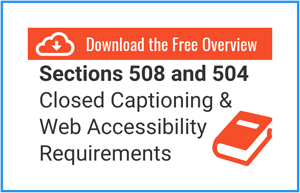Accessibility Laws for Local Government
Updated: September 20, 2023
The federal government requires the governments of municipalities (towns and cities) to guarantee equal opportunity for people with disabilities.
Physical structures, electronic information, and any other official activities or programs at the local government level must be accessible to all citizens.
While cities and towns may also have their own elective accessibility policies, they must exist under the umbrella of two major pieces of legislation: The ADA and the Rehabilitation Act.
The Americans with Disabilities Act and its amendments guarantee equal opportunity for people with disabilities in employment, state and local government services, public accommodations, commercial facilities, and transportation.
Title II of the ADA prohibits disability discrimination by all public entities at the state and local level.
To comply with this law, state and local government entities:
- May not refuse to allow a person with a disability to participate in a service, program, or activity simply because the person has a disability.
- Must provide programs and services in an integrated setting, unless separate or different measures are necessary to ensure equal opportunity.
- Must furnish auxiliary aids and services when necessary to ensure effective communication, unless an undue burden or fundamental alteration would result.
- Shall operate their programs so that, when viewed in their entirety, they are readily accessible and usable by individuals with disabilities.
Although the language of the ADA is from 1990 and does not specifically mention websites or web content, it does require “auxiliary aids” for people with disabilities in government communication.
Local government websites are a major means of communicating information to the public. Consequentially, town and city government websites, and any web content (including multimedia content like images, audio, or video), must be made accessible to users of all abilities.
In order to achieve “effective communication” with people who have disabilities, the ADA’s guide for “small towns” recommends auxiliary aids like “qualified sign language interpreters, assistive listening devices, open and closed captioning, notetakers, written materials, telephone handset devices, qualified readers, taped texts, audio recordings, Brailled materials, materials on computer disk, and large print materials.”
For video content on government websites, closed captioning and audio description are good examples of auxiliary aids that can benefit users across the widest range of abilities.
Section 504 of the Rehabilitation Act prohibits federal and federally funded programs from discriminating against people with disabilities.
This section of the Act declares that:
- “No otherwise qualified individual with a disability in the United States […] shall, solely by reason of her or his disability, be excluded from the participation in, be denied the benefits of, or be subjected to discrimination under any program or activity receiving Federal financial assistance or any program or activity conducted by any Executive agency or by the United States Postal Service.”
Title II of the ADA extends the requirements of Section 504 to all state and local government activities regardless of whether or not these entities receive federal funding.
A local government’s website and web content can be considered a “program or activity” and local governments must therefore ensure there are no barriers when someone with a disability attempts to access that content.
Not sure if your online content is accessible? Take this quiz to find out!









